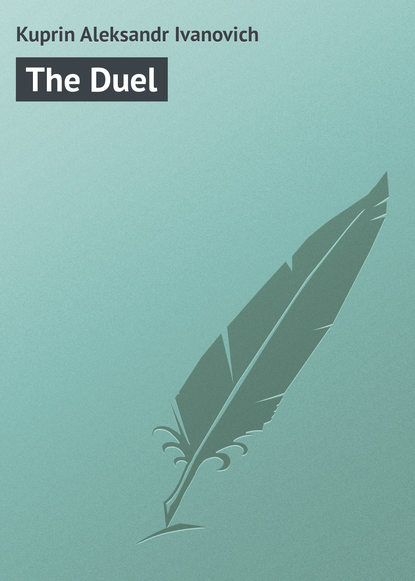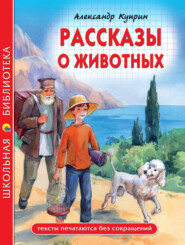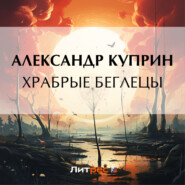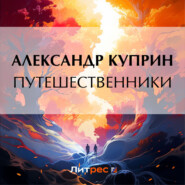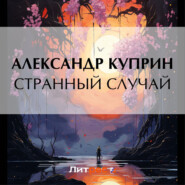По всем вопросам обращайтесь на: info@litportal.ru
(©) 2003-2025.
✖
The Duel
Настройки чтения
Размер шрифта
Высота строк
Поля
This gloomy, silent monologue forced tears from Romashov’s eyes, but he did not wipe them away. It was so delicious to imagine himself a martyr, an innocent victim to the malignity of mankind.
He had now reached the white-beet field, the extensive surface of which had an almost oppressive influence on Romashov. He climbed on to a little hillock just beside the ravine in which the railway ran.
There he stood. This side of the ravine lay in deep shadow, but the opposite one was so powerfully illuminated that one might fancy it possible to distinguish every blade of grass. The ravine was very precipitous near the place where Romashov was now standing, and at the bottom of it the rails, worn bright by traffic, shone. Far away in the field on the other side of the railway the white, pyramid-like tents could be seen in even rows.
A little way down the slope of the ravine was a small platform. Romashov glided down to it and sat on the grass. He felt nearly sick from hunger and weariness, and his legs shook from exhaustion. The great deserted field behind him, the air, clear and transparent in spite of the shades of night, the dew-soaked grass – all was sunk in a deep, insidious, luminous silence, the intensity of which was felt by Romashov like a strong buzzing in his ear. Rarely indeed might be heard from a locomotive manœuvring at the railway station a shrill whistling which, in the solemn stillness of the night, brought with it something impetuous, impatient, and threatening.
Romashov laid himself on his back in the grass. The fleecy white clouds right above him stood motionless, but over them the round moon glided rapidly on in the dark firmament which, cold and bare and boundless, riveted Romashov’s gaze. All the illimitable space between earth and heaven seemed to him fraught with eternal terror and eternal longing. “There dwells – God,” thought Romashov, and suddenly, with a naïve outburst of sorrow, anger, and self-pity, he whispered passionately and bitterly —
“God, why hast Thou turned Thy countenance from me? What offence can I – a miserable worm, a grain of sand – have committed against Thee? Thou art almighty, Thou art good, Thou seest and hearest everything – why hast Thou suffered injustice and malice so to triumph over me?”
But instantly afterwards he was filled with alarm at his blasphemous speech, and he went on to say in fervour and anguish —
“No, no; forgive and forget my sinful words. I know Thou art as wise as Thou art merciful, and I shall never murmur any more. Do with me what seems best in Thy sight. I will always submit to Thy will with gratitude and a meek heart.”
Simultaneously with these pious words of penance and reformation there stirred in the depth of his soul a secret calculating thought that his solemnly promised submission to our Lord’s will would move the All-seeing God suddenly to work, on his behalf, a miracle whereby all the bitter sorrows and trials of this day would appear only as a hideous dream.
“Where are you?” shrieked just then a locomotive down at the station with a short, angry, impatient whistle. Another engine at once answered, in a hollow, threatening tone, “I am coming.”
From the moonlit crest of the ravine’s opposite slope a soft rustle was heard. In order more easily to detect the cause, Romashov raised his head from the ground. A grey, shapeless, scarcely human figure was sliding down to the bottom of the ravine. In spite of the bright moonlight, it was difficult to distinguish the night-walker in the high grass, and only by the movements of his shadow was it possible for any one to follow with the eye his course down the declivity.
Now he was crossing the railway-line. “Judging from everything,” guessed Romashov, “he is a soldier. Anyhow it’s a human being; but who can it be? A drunkard or a sleep-walker?”
The strange figure had already crossed the railway, stepped into the shade, and was climbing toilsomely up the slope on which Romashov was. The latter now saw distinctly that the wanderer was a soldier, who, however, immediately afterwards disappeared from Romashov’s sight. Two or three minutes elapsed before he again became visible. A round-clipped head without a cap was slowly lifted in Romashov’s direction, who now recognized, without difficulty, the left wing soldier in his own half-company – the unfortunate Khliabnikov.
Khliabnikov went on his way bareheaded and with his cap in his hand, looking fixedly before him. It was evident that he was labouring under the influence of a mysterious inward force. He passed so near Romashov that the latter’s cloak almost grazed his own. The moon’s keen rays were reflected in the motionless pupils beneath the unnaturally wide-open eyelids.
“Khliabnikov, is it you?” cried Romashov.
“A-ah!” shouted the soldier, who stopped immediately, and began to shake all over.
Romashov jumped up from the ground. He saw before him a disfigured face, as pale as a corpse’s, with severed, bleeding lips, and one eye almost closed up by a tremendous bump turning blue. In the uncertain evening light the traces of the disgusting violence that had been perpetrated gained a still more horrible appearance. And as Romashov gazed at Khliabnikov, his thoughts ran thus: “Behold the man who with me brought shame on the entire regiment to-day. We are both equally to be pitied.”
“Where were you going, my friend? what’s the matter?” asked Romashov, in his tenderest tone, and, without thinking, he put both his hands on the soldier’s shoulders. Khliabnikov stared at him out of his uninjured eye with the wild look of one who had been frightened out of his wits, but he turned away at once. His bleeding lips, welded together, slowly opened with a soft, smacking sound, but all he could utter was a hoarse rattle. Romashov suddenly experienced an intolerable feeling of sickness, and he thought he felt in his chest and abdomen certain symptoms which usually precede fainting.
“Has some one beaten you, eh? Tell me! Come and sit down beside me.” He pulled the soldier by the sleeve of his coat down to the ground. Khliabnikov obediently collapsed, like a dummy fallen in a heap, and sank noiselessly down on the damp grass beside Romashov.
“Where were you going?” asked the latter. Khliabnikov did not answer a word where he sat, in a very unnatural and uncomfortable position, with his legs straddling. Romashov noticed that his head sank slowly, with scarcely perceptible little nods, on his chest. Again Romashov heard the same short, hoarse, rattling sound, and his whole soul was filled by an unspeakable pity. “Do I understand that you wanted to run away? Put on your cap and listen, Khliabnikov. At this moment I am not your officer or superior, but, like yourself, only a lonely, unlucky, ruined creature. I can understand how hard and burdensome it is for you to live, therefore speak to me frankly, tell me all. Perhaps you meant to kill yourself?” he added in a hollow, whispering tone.
A gurgling noise was again heard in the soldier’s throat, but not a word passed his lips. At the same moment Romashov noticed that his companion in misfortune was shaking from head to foot as if from a chill, and he was himself now attacked by an unconquerable terror. This sleepless night passed in feverish excitement; this feeling of loneliness and desertion; the moon’s unchangeable, oppressive, cold gleam; the ravine’s black depth beneath his feet; the dumb, cruelly maltreated soldier at his side – all this seemed to him like a mad, insufferable dream – one of those dreams that are wont to herald the approach of death. But directly afterwards he was again seized by the same infinite pity for the unfortunate victim beside him, and it was clear to him at once how petty and insignificant was his own sorrow in comparison with Khliabnikov’s cruel fate. With sincere tenderness he threw his arm round the soldier’s neck, drew him forcibly to him, and said, with the warmth that belongs to conviction —
“Khliabnikov, you find life unsupportable, but, my friend, believe me, even I am an exceedingly unhappy man. The whole world wherein I live is to me a puzzle. Everything is so savage, cruel, and senseless. However, one must be patient, one must learn to suffer.”
Khliabnikov’s bowed head fell suddenly on Romashov’s knee, which he embraced with both arms. All his being shook with suppressed weeping.
“I can’t stand any more,” he uttered at last, “I’ll bear it no longer. Oh, my God! They beat me, they mock me; the sergeants shriek for schnapps and money. Where is a poor devil like me to get money? And then they beat me again – me, who have suffered from childhood from an incurable pain – a severe rupture.”
Romashov bent down over his head, which shook convulsively backwards and forwards against Romashov’s knee. He perceived the smell of the soldier’s dirty, unhealthy body, and the rank stench of his cloak, which also served as a counterpane during the cold nights in his tent. An infinite sorrow for and disgust at himself, his profession, and the whole world harrowed the young officer’s soul. With overflowing heart he rested his forehead against Khliabnikov’s burning head and stubbly hair, at the same time whispering scarcely audibly —
“My brother!”
Khliabnikov grasped Romashov’s hand, on which a few warm tears fell. Romashov even felt two cold, clammy lips kissing his fingers, but he did not withdraw his hand, and he spoke simple, calming, touching words, just as when one talks to a weeping, injured child.
Then he escorted Khliabnikov back to the camp, and then sent for Shapovalenko, the sergeant on duty that day in the 6th Company. The latter came out hurriedly, clad in an obviously imperfect costume, peered for a while with a pair of drowsy eyes, scratched himself both back and front with an earnestness that was probably more than justified. After several tremendous yawns he became gradually awake to the situation.
Romashov ordered him to release Khliabnikov from any duties he might happen to have just then.
“Your Honour, this may perhaps be a little premature.”
“No arguing!” shrieked Romashov in a furious tone. “Tell the Captain to-morrow that you acted on my instructions.” Then turning to Khliabnikov, he added: “We meet to-morrow, you know, at my house,” and received in reply a long, shy, grateful look.
Romashov slowly turned his steps homewards along the camp. A few words caught from a whispered conversation in one of the tents caused him to stop and listen: “You see, comrades,” says a subdued voice, “that this same devil sends the soldier his very chief magician. When the magician catches sight of the soldier, he roars at him like this: ‘What’s a soldier to me? I’ll eat him!’ ‘No,’ replies the soldier, ‘you can’t do that, old chap, for I myself am a magician – ’”
Romashov soon reached the ravine again. Once more that indescribable feeling of disgust at life and contempt of the inanity and senselessness of the work of creation. Whilst descending the declivity he stopped suddenly and raised his eyes to heaven. Again he was met by the same infinite, icy-cold firmament; again he experienced the same longing, mingled with fear and anguish, and almost unconsciously he raised his fists threateningly against heaven, and in the voice of a man foaming with rage, in words of unspeakable blasphemy, challenged his Maker’s omnipotence, and dared Him, in proof of it, to break off his arms and legs.
Romashov, deliberately and with his eyes shut, threw himself down the precipice, and alighted unscathed on the railway bank. With two leaps he gained the opposite slope, the top of which he reached without stopping or taking breath. His nostrils were dilated, and his chest heaved violently under convulsive efforts to regain his breath, but in the depths of his soul there blazed a proud, triumphant feeling of malicious joy and defiance.
XVI
THERE was a lesson on military drill going on in the school of recruits. In a close room, on benches arranged in a square, sat the soldiers of the 3rd platoon facing one another. In the middle of this square Corporal Syeroshtán walked to and fro. Close by, walking backwards and forwards in the centre of a similar square, was the non-commissioned officer Shapovalenko.
“Bondarenko!” cried Syeroshtán in a piercing voice.
Bondarenko brought his feet down on the floor with a bang, and jumped up just like a jack-in-the-box.
“Now, Bondarenko, suppose that you were standing at arms, and the commander came to you and asked: ‘What is that in your hands, Bondarenko?’ What ought you to answer?”
“A gun,” replied Bondarenko after reflection.
“Wrong! Do you mean to tell me you would call it a gun? At home you might call it a gun, certainly, but in the service it is called simply a sharp-shooting infantry rifle of small calibre, maker Berdan, number two, with a sliding bolt. Repeat that now, you son of a – !”
Bondarenko gabbled over the words, which he evidently knew by heart.
“Sit down!” commanded Syeroshtán graciously. “And for what purpose is the rifle given you?” His stern gaze wandered round the class. “Shevchuk! you answer this question.”
Shevchuk stood up with a morose expression, and answered in a deep bass voice, speaking through his nose, and very slowly, and in detached phrases, as if there were a full stop after each:
“It is given to me in order that in time of peace I may practise with it. But in time of war that I may protect my Emperor and my country from enemies.” He stopped, scratched his nose, and added obscurely: “Whether they be external or internal.”
“Right! You know that very well, Shevchuk, only you mumble. Sit down. And now, Ovechkin, tell me, whom do we call external enemies?”
Ovechkin, a sprightly soldier from Orlov, answered rapidly and with great animation, spluttering with excitement:
“External enemies are all those nations with whom we might go to war; the French, Germans, Italians, Turks, Europeans – ”
“Wait,” Syeroshtán cut him short. “All that is not in the text. Sit down. And now tell me – Arkhipov! Who are our internal enemies?”
He uttered the last two words very loudly, as if to emphasize them, and threw a meaning glance at the volunteer, Markouson.
He had now reached the white-beet field, the extensive surface of which had an almost oppressive influence on Romashov. He climbed on to a little hillock just beside the ravine in which the railway ran.
There he stood. This side of the ravine lay in deep shadow, but the opposite one was so powerfully illuminated that one might fancy it possible to distinguish every blade of grass. The ravine was very precipitous near the place where Romashov was now standing, and at the bottom of it the rails, worn bright by traffic, shone. Far away in the field on the other side of the railway the white, pyramid-like tents could be seen in even rows.
A little way down the slope of the ravine was a small platform. Romashov glided down to it and sat on the grass. He felt nearly sick from hunger and weariness, and his legs shook from exhaustion. The great deserted field behind him, the air, clear and transparent in spite of the shades of night, the dew-soaked grass – all was sunk in a deep, insidious, luminous silence, the intensity of which was felt by Romashov like a strong buzzing in his ear. Rarely indeed might be heard from a locomotive manœuvring at the railway station a shrill whistling which, in the solemn stillness of the night, brought with it something impetuous, impatient, and threatening.
Romashov laid himself on his back in the grass. The fleecy white clouds right above him stood motionless, but over them the round moon glided rapidly on in the dark firmament which, cold and bare and boundless, riveted Romashov’s gaze. All the illimitable space between earth and heaven seemed to him fraught with eternal terror and eternal longing. “There dwells – God,” thought Romashov, and suddenly, with a naïve outburst of sorrow, anger, and self-pity, he whispered passionately and bitterly —
“God, why hast Thou turned Thy countenance from me? What offence can I – a miserable worm, a grain of sand – have committed against Thee? Thou art almighty, Thou art good, Thou seest and hearest everything – why hast Thou suffered injustice and malice so to triumph over me?”
But instantly afterwards he was filled with alarm at his blasphemous speech, and he went on to say in fervour and anguish —
“No, no; forgive and forget my sinful words. I know Thou art as wise as Thou art merciful, and I shall never murmur any more. Do with me what seems best in Thy sight. I will always submit to Thy will with gratitude and a meek heart.”
Simultaneously with these pious words of penance and reformation there stirred in the depth of his soul a secret calculating thought that his solemnly promised submission to our Lord’s will would move the All-seeing God suddenly to work, on his behalf, a miracle whereby all the bitter sorrows and trials of this day would appear only as a hideous dream.
“Where are you?” shrieked just then a locomotive down at the station with a short, angry, impatient whistle. Another engine at once answered, in a hollow, threatening tone, “I am coming.”
From the moonlit crest of the ravine’s opposite slope a soft rustle was heard. In order more easily to detect the cause, Romashov raised his head from the ground. A grey, shapeless, scarcely human figure was sliding down to the bottom of the ravine. In spite of the bright moonlight, it was difficult to distinguish the night-walker in the high grass, and only by the movements of his shadow was it possible for any one to follow with the eye his course down the declivity.
Now he was crossing the railway-line. “Judging from everything,” guessed Romashov, “he is a soldier. Anyhow it’s a human being; but who can it be? A drunkard or a sleep-walker?”
The strange figure had already crossed the railway, stepped into the shade, and was climbing toilsomely up the slope on which Romashov was. The latter now saw distinctly that the wanderer was a soldier, who, however, immediately afterwards disappeared from Romashov’s sight. Two or three minutes elapsed before he again became visible. A round-clipped head without a cap was slowly lifted in Romashov’s direction, who now recognized, without difficulty, the left wing soldier in his own half-company – the unfortunate Khliabnikov.
Khliabnikov went on his way bareheaded and with his cap in his hand, looking fixedly before him. It was evident that he was labouring under the influence of a mysterious inward force. He passed so near Romashov that the latter’s cloak almost grazed his own. The moon’s keen rays were reflected in the motionless pupils beneath the unnaturally wide-open eyelids.
“Khliabnikov, is it you?” cried Romashov.
“A-ah!” shouted the soldier, who stopped immediately, and began to shake all over.
Romashov jumped up from the ground. He saw before him a disfigured face, as pale as a corpse’s, with severed, bleeding lips, and one eye almost closed up by a tremendous bump turning blue. In the uncertain evening light the traces of the disgusting violence that had been perpetrated gained a still more horrible appearance. And as Romashov gazed at Khliabnikov, his thoughts ran thus: “Behold the man who with me brought shame on the entire regiment to-day. We are both equally to be pitied.”
“Where were you going, my friend? what’s the matter?” asked Romashov, in his tenderest tone, and, without thinking, he put both his hands on the soldier’s shoulders. Khliabnikov stared at him out of his uninjured eye with the wild look of one who had been frightened out of his wits, but he turned away at once. His bleeding lips, welded together, slowly opened with a soft, smacking sound, but all he could utter was a hoarse rattle. Romashov suddenly experienced an intolerable feeling of sickness, and he thought he felt in his chest and abdomen certain symptoms which usually precede fainting.
“Has some one beaten you, eh? Tell me! Come and sit down beside me.” He pulled the soldier by the sleeve of his coat down to the ground. Khliabnikov obediently collapsed, like a dummy fallen in a heap, and sank noiselessly down on the damp grass beside Romashov.
“Where were you going?” asked the latter. Khliabnikov did not answer a word where he sat, in a very unnatural and uncomfortable position, with his legs straddling. Romashov noticed that his head sank slowly, with scarcely perceptible little nods, on his chest. Again Romashov heard the same short, hoarse, rattling sound, and his whole soul was filled by an unspeakable pity. “Do I understand that you wanted to run away? Put on your cap and listen, Khliabnikov. At this moment I am not your officer or superior, but, like yourself, only a lonely, unlucky, ruined creature. I can understand how hard and burdensome it is for you to live, therefore speak to me frankly, tell me all. Perhaps you meant to kill yourself?” he added in a hollow, whispering tone.
A gurgling noise was again heard in the soldier’s throat, but not a word passed his lips. At the same moment Romashov noticed that his companion in misfortune was shaking from head to foot as if from a chill, and he was himself now attacked by an unconquerable terror. This sleepless night passed in feverish excitement; this feeling of loneliness and desertion; the moon’s unchangeable, oppressive, cold gleam; the ravine’s black depth beneath his feet; the dumb, cruelly maltreated soldier at his side – all this seemed to him like a mad, insufferable dream – one of those dreams that are wont to herald the approach of death. But directly afterwards he was again seized by the same infinite pity for the unfortunate victim beside him, and it was clear to him at once how petty and insignificant was his own sorrow in comparison with Khliabnikov’s cruel fate. With sincere tenderness he threw his arm round the soldier’s neck, drew him forcibly to him, and said, with the warmth that belongs to conviction —
“Khliabnikov, you find life unsupportable, but, my friend, believe me, even I am an exceedingly unhappy man. The whole world wherein I live is to me a puzzle. Everything is so savage, cruel, and senseless. However, one must be patient, one must learn to suffer.”
Khliabnikov’s bowed head fell suddenly on Romashov’s knee, which he embraced with both arms. All his being shook with suppressed weeping.
“I can’t stand any more,” he uttered at last, “I’ll bear it no longer. Oh, my God! They beat me, they mock me; the sergeants shriek for schnapps and money. Where is a poor devil like me to get money? And then they beat me again – me, who have suffered from childhood from an incurable pain – a severe rupture.”
Romashov bent down over his head, which shook convulsively backwards and forwards against Romashov’s knee. He perceived the smell of the soldier’s dirty, unhealthy body, and the rank stench of his cloak, which also served as a counterpane during the cold nights in his tent. An infinite sorrow for and disgust at himself, his profession, and the whole world harrowed the young officer’s soul. With overflowing heart he rested his forehead against Khliabnikov’s burning head and stubbly hair, at the same time whispering scarcely audibly —
“My brother!”
Khliabnikov grasped Romashov’s hand, on which a few warm tears fell. Romashov even felt two cold, clammy lips kissing his fingers, but he did not withdraw his hand, and he spoke simple, calming, touching words, just as when one talks to a weeping, injured child.
Then he escorted Khliabnikov back to the camp, and then sent for Shapovalenko, the sergeant on duty that day in the 6th Company. The latter came out hurriedly, clad in an obviously imperfect costume, peered for a while with a pair of drowsy eyes, scratched himself both back and front with an earnestness that was probably more than justified. After several tremendous yawns he became gradually awake to the situation.
Romashov ordered him to release Khliabnikov from any duties he might happen to have just then.
“Your Honour, this may perhaps be a little premature.”
“No arguing!” shrieked Romashov in a furious tone. “Tell the Captain to-morrow that you acted on my instructions.” Then turning to Khliabnikov, he added: “We meet to-morrow, you know, at my house,” and received in reply a long, shy, grateful look.
Romashov slowly turned his steps homewards along the camp. A few words caught from a whispered conversation in one of the tents caused him to stop and listen: “You see, comrades,” says a subdued voice, “that this same devil sends the soldier his very chief magician. When the magician catches sight of the soldier, he roars at him like this: ‘What’s a soldier to me? I’ll eat him!’ ‘No,’ replies the soldier, ‘you can’t do that, old chap, for I myself am a magician – ’”
Romashov soon reached the ravine again. Once more that indescribable feeling of disgust at life and contempt of the inanity and senselessness of the work of creation. Whilst descending the declivity he stopped suddenly and raised his eyes to heaven. Again he was met by the same infinite, icy-cold firmament; again he experienced the same longing, mingled with fear and anguish, and almost unconsciously he raised his fists threateningly against heaven, and in the voice of a man foaming with rage, in words of unspeakable blasphemy, challenged his Maker’s omnipotence, and dared Him, in proof of it, to break off his arms and legs.
Romashov, deliberately and with his eyes shut, threw himself down the precipice, and alighted unscathed on the railway bank. With two leaps he gained the opposite slope, the top of which he reached without stopping or taking breath. His nostrils were dilated, and his chest heaved violently under convulsive efforts to regain his breath, but in the depths of his soul there blazed a proud, triumphant feeling of malicious joy and defiance.
XVI
THERE was a lesson on military drill going on in the school of recruits. In a close room, on benches arranged in a square, sat the soldiers of the 3rd platoon facing one another. In the middle of this square Corporal Syeroshtán walked to and fro. Close by, walking backwards and forwards in the centre of a similar square, was the non-commissioned officer Shapovalenko.
“Bondarenko!” cried Syeroshtán in a piercing voice.
Bondarenko brought his feet down on the floor with a bang, and jumped up just like a jack-in-the-box.
“Now, Bondarenko, suppose that you were standing at arms, and the commander came to you and asked: ‘What is that in your hands, Bondarenko?’ What ought you to answer?”
“A gun,” replied Bondarenko after reflection.
“Wrong! Do you mean to tell me you would call it a gun? At home you might call it a gun, certainly, but in the service it is called simply a sharp-shooting infantry rifle of small calibre, maker Berdan, number two, with a sliding bolt. Repeat that now, you son of a – !”
Bondarenko gabbled over the words, which he evidently knew by heart.
“Sit down!” commanded Syeroshtán graciously. “And for what purpose is the rifle given you?” His stern gaze wandered round the class. “Shevchuk! you answer this question.”
Shevchuk stood up with a morose expression, and answered in a deep bass voice, speaking through his nose, and very slowly, and in detached phrases, as if there were a full stop after each:
“It is given to me in order that in time of peace I may practise with it. But in time of war that I may protect my Emperor and my country from enemies.” He stopped, scratched his nose, and added obscurely: “Whether they be external or internal.”
“Right! You know that very well, Shevchuk, only you mumble. Sit down. And now, Ovechkin, tell me, whom do we call external enemies?”
Ovechkin, a sprightly soldier from Orlov, answered rapidly and with great animation, spluttering with excitement:
“External enemies are all those nations with whom we might go to war; the French, Germans, Italians, Turks, Europeans – ”
“Wait,” Syeroshtán cut him short. “All that is not in the text. Sit down. And now tell me – Arkhipov! Who are our internal enemies?”
He uttered the last two words very loudly, as if to emphasize them, and threw a meaning glance at the volunteer, Markouson.





